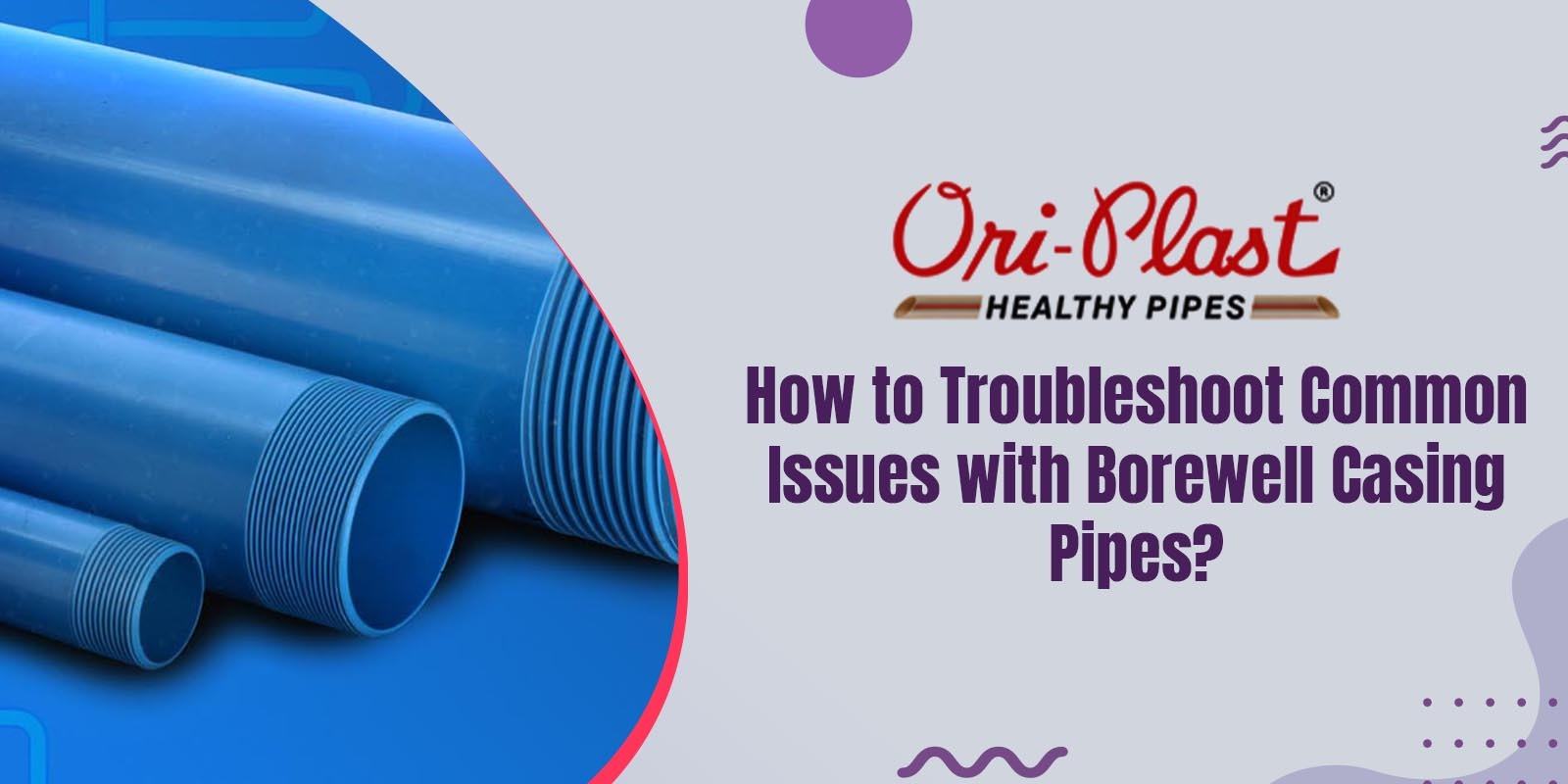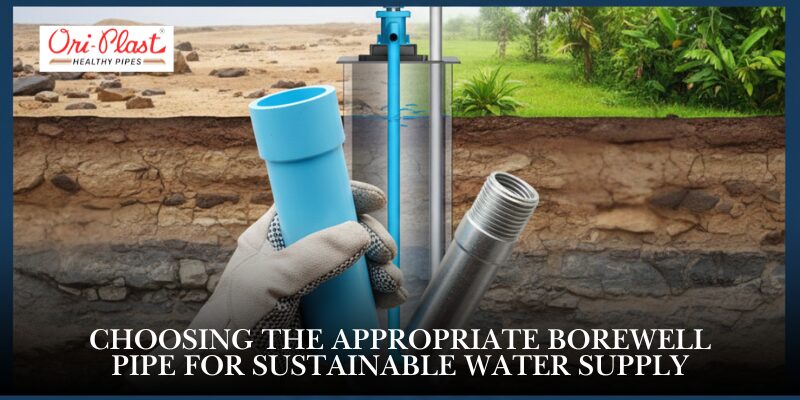Borewell casing pipes are an essential component of any borewell system. These pipes are typically made of high-quality materials such as PVC or stainless steel and are designed to withstand the harsh conditions of underground drilling. The primary function of the borewell casing pipe is to prevent the walls of the borewell from collapsing and to protect the pump and the water inside from contamination.
Despite their durability, borewell casing pipes may encounter common issues that need troubleshooting. These issues can range from minor blockages to serious leaks or damage to the pipes. It is important to address these issues as soon as possible to prevent any further damage to the borewell system and ensure a steady supply of clean water. In this article, we will discuss some of the most common issues that can occur with borewell casing pipes and provide troubleshooting techniques to help you address them.
Common issues with borewell casing pipes
Borewell casing pipes are designed to be durable and long-lasting, but they can still encounter common issues that require troubleshooting. Some of the most common issues that can occur with borewell casing pipe include:
- Corrosion: Over time, exposure to water, soil, and other elements can cause corrosion of the casing pipes. This can lead to weakened spots in the pipes and even holes or leaks if left untreated.
- Cracking or fractures: Borewell casing pipe can sometimes crack or fracture due to external pressure, shifting soil, or other factors. These cracks can allow dirt and debris to enter the pipes and clog the system.
- Clogging or blockages: Borewell casing pipe can become clogged or blocked due to sediment buildup or the growth of algae or other organisms. This can reduce the flow of water through the pipes and lead to reduced water supply or even damage to the pump.
- Leaks: In some cases, borewell casing pipeS can develop leaks due to corrosion, cracks, or other issues. These leaks can lead to a loss of water and can also cause damage to the surrounding soil and vegetation.
It is important to address these common issues with borewell casing pipes as soon as possible, as they can lead to a reduction in the water supply or even damage to the borewell system if left untreated. In the following section, we will discuss some troubleshooting techniques for each of these common issues.
Troubleshooting techniques for borewell casing pipes
Corrosion
- To troubleshoot corrosion, visually inspect the borewell casing pipes for signs of damage, such as discoloration or rusting. If you notice any damage, carefully clean the affected area and apply a rust converter or protective coating to prevent further corrosion. You may also need to replace the damaged section of the pipe if the corrosion is severe.
Cracking or fractures
- To troubleshoot cracks or fractures, visually inspect the borewell casing pipes for any visible signs of damage. You can also use a borescope or camera to inspect the interior of the pipes. If you detect any cracks or fractures, you may need to replace the damaged section of the pipe or install a sleeve or liner to reinforce the damaged area.
Clogging or blockages
- To troubleshoot clogs or blockages, test the flow rate of water from the borewell pump. If the flow rate is lower than normal, this could indicate a blockage in the borewell casing pipes. To remove the blockage, you can try flushing the pipes with water or using a pipe-cleaning solution. You may also need to physically remove any debris or sediment from the pipes using a pipe scraper or other tool.
Leaks
- To troubleshoot leaks, use a pressure gauge to check the pressure inside the borewell casing pipes. If the pressure is lower than normal, this could indicate a leak. Use a leak detection solution to locate the source of the leak and then repair the damaged area using a pipe repair kit or by replacing the damaged section of the pipe.
In conclusion, borewell pipes are a critical component of any borewell system, and it is important to troubleshoot any issues that may arise in a timely manner to prevent damage to the system and ensure a steady supply of clean water. By following these troubleshooting techniques, you can identify and address common issues such as corrosion, cracking, clogging, and leaks in your borewell casing pipes.
Preventative measures for borewell casing pipes
Preventing common issues with borewell casing pipes is easier than troubleshooting them after they occur. Here are some simple preventative measures you can take to ensure the longevity and efficiency of your borewell system:
Regular cleaning and maintenance
Regular cleaning and maintenance of borewell casing pipes are essential to prevent blockages, sediment buildup, and other issues. Schedule regular inspections and cleaning of your borewell system, including the casing pipes, to prevent these issues from arising.
Proper installation and sealing of casing pipes
Proper installation and sealing of borewell casing pipe can prevent corrosion and leaks. Ensure that the pipes are installed according to manufacturer guidelines and that the joints are properly sealed with high-quality fittings to prevent leaks.
Use of high-quality materials and fittings
Using high-quality materials and fittings when installing or repairing borewell casing pipe can help prevent issues such as cracking, corrosion, and leaks. Use pipes and fittings that are designed specifically for borewell applications and are made of durable materials that can withstand the harsh conditions of a borewell.
By taking these preventative measures, you can avoid common issues with borewell casing pipe and ensure that your borewell system remains efficient and effective for years to come.
Conclusion
in conclusion, borewell casing pipes play an important role in the overall functioning of a borewell system, but they can encounter common issues that require troubleshooting. These issues include corrosion, cracking, clogging, and leaks, which can cause a reduction in the water supply or even damage to the borewell system.
To troubleshoot these issues, you can visually inspect the pipes for signs of damage, test the water flow rate to identify blockages and use a pressure gauge to detect leaks. Taking preventative measures such as regular cleaning and maintenance, proper installation and sealing of casing pipes, and using high-quality materials and fittings can help avoid these issues altogether.
Regular maintenance and prompt troubleshooting are essential for keeping borewell systems functioning at their best. So if you are experiencing any issues with your borewell casing pipe, it's important to take action and troubleshoot them promptly.
By following the troubleshooting techniques and preventative measures outlined in this article, you can ensure the longevity and efficiency of your borewell system, and enjoy a steady supply of clean water for years to come.
Looking For Good Quality Borewell & Column Pipes? , Get the best from Borewell Casing Pipes manufacturer in West Bengal.




